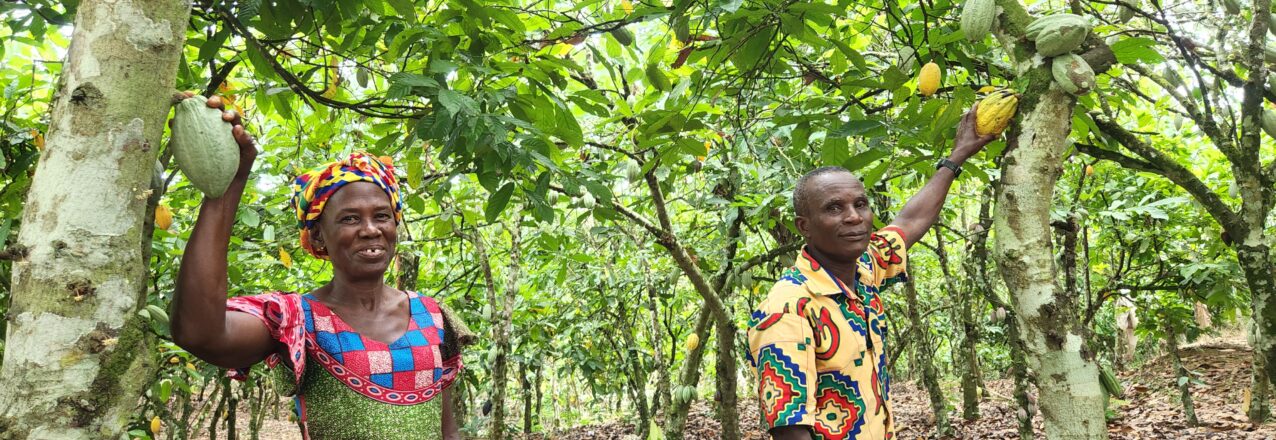Under the Integrated Land and Resource Governance (ILRG) program, a five-year global mechanism (2018-2023), USAID worked with private sector partners on two activities to strengthen the cocoa economy in Ghana.
- Deforestation activity: ILRG worked with Hershey and ECOM Agroindustrial Corp., a global commodity exporter, to support cocoa communities to clarify and document their land rights. The activity aimed to reduce deforestation and rehabilitate old and diseased farms to improve cocoa production in the country, creating a pathway to improved economic growth and resilience. Many cocoa farmers in Ghana rent their land, which impacts their ability to replant and rehabilitate aging cocoa trees. ILRG worked with owners and renters to formalize rental agreements and provide a process for farmers to rehabilitate their plots. The activity also worked with Hershey to develop a payment for ecosystem services (PES) scheme to incentivize the planting and upkeep of shade trees, which helped increase cocoa tree productivity and contributed to national conservation goals. Resources produced under this activity include research and reflections on the state of land and tree tenure laws in Ghana and what reforms might allow for better outcomes for farmers and renters alike.
- Women’s Economic Empowerment Activity: ILRG also worked with ECOM to better integrate gender equality and social inclusion considerations into the company’s internal policies and into their external engagement processes with cocoa farmers. ILRG trained all ECOM management and field staff on gender equality and women’s empowerment and helped adapt ECOM’s training programs to help shift harmful gender norms that constrain women’s access to and control of resources. ECOM established village savings and loan associations (VSLAs) for women in cocoa communities and supported them to engage in alternative livelihood activities to diversify their income streams. Resources produced under this activity include training manuals on women’s economic empowerment and gender norms, as well as reflections on the experience of working with the private sector on gender equality and women’s empowerment.
Resources Produced under the Deforestation Activity:
- Supporting Deforestation-Free Cocoa in Ghana Planning Workshop Report: Readout from deforestation activity planning workshop in November 2018.
- Supporting Deforestation-Free Cocoa in Ghana: Implementation Plan: Implementation plan for the deforestation-free cocoa work in Ghana under ILRG.
- Supporting Deforestation-free Cocoa in Ghana Activity: Land Use Planning Diagnostic Report: This report documents outcomes from a land use planning exercise carried out in activity communities under the deforestation work.
- Viability of a Cost Recovery Model for Farm-Level Tenure Documentation and Tree Tenure Registration: Experiences from the Asankrangwa Stool: This report looks at the economic viability of a fee-for-service model for land documentation piloted under ILRG.
- Standard Operating Procedures for Terrestrial Carbon Measurement: Cocoa Agroforestry Systems: Standard operating procedures for implementing the payment for ecosystem services scheme with Hershey in Ghana.
- Responsible Land-Based Investment Project in Ghana: Case study on the private sector partnership between Hershey, ECOM, and USAID under ILRG.
- Rooted in the ground: Reforming Ghana’s forest laws to incentivize cocoa-based agroforestry (Brief, Report, Policy Maker Summary): This report analyzes tree tenure law and policy in Ghana, including the proposed tree registration policy and justifications for state ownership of naturally occurring trees based in the 1992 Constitution.
- Economic Analysis of Proposed Tree Tenure Reform in Ghana: Assessment prepared under the first deforestation activity that reviews the economic impact of a proposed tree tenure policy reform in Ghana that transfers dual ownership of all trees to farmers and landowners.
- Supporting Deforestation-Free Cocoa in Ghana, 2018-2022: Final report on Ghana deforestation activity, including lessons learned on tree and land tenure documentation, cocoa farm rehabilitation, payment for ecosystem services, and land use planning.
Resources Produced under the Women’s Economic Empowerment Activity:
- Women’s Land Rights and Economic Empowerment in Cocoa Communities in Ghana – Gender Assessment (Brief, Report): Gender assessment to better understand the key barriers and opportunities for women in cocoa communities and to inform the design of interventions.
- Women’s Land Rights and Empowerment in Cocoa Communities in Ghana Implementation Plan: Implementation plan for the women’s economic empowerment work with ECOM in Ghana under ILRG.
- ECOM Ghana Women’s Empowerment and Entrepreneurship Training Manual for Women in Cocoa Farming Communities: Facilitation guide for providing participatory training on empowerment skills, entrepreneurship, and financial literacy for women.
- ECOM Ghana Good Social Practices and Gender Norms Training Manual: Facilitation guide for facilitating household gender norms dialogues that bring men and women together to discuss harmful gender norms related to access to resources, gendered division of labor, gendered decision-making, and gender-based violence.
- Women’s Land Rights and Economic Empowerment in Cocoa Communities in Ghana: Final report on ILRG Ghana women’s empowerment work, with key results, lessons learned, and recommendations.


